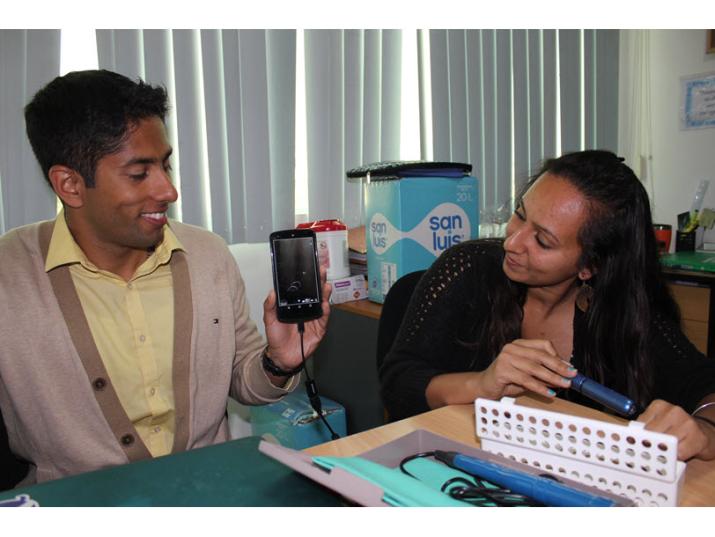
Manish Nair (left) and Denali Dahl demonstrate how the POCkeT colposcope interacts with a smartphone
Published December 13, 2016, last updated on June 3, 2020 under Research News
Cervical cancer, a common cause of cancer-related deaths in low and middle income countries, is easily treated if detected early. But there are many barriers to screening and treating women, including limited access to clinics, shortage of pathologists and lack of equipment such as colposcopes.
To help address these challenges, Nimmi Ramanujam, professor of biomedical engineering and global health and director of the Center for Global Women’s Health Technologies, has developed a device called a POCkeT (Point Of Care Tampon) colposcope. This device is significantly smaller, less expensive and easier to use than a state-of-the-art digital colposcope. The latest generation is battery-powered and can transmit data to a smartphone.
Students Explore the Human Side of Engineering
This summer, Master of Science in Global Health candidate Denali Dahl collaborated with clinicians at the Lima, Peru-based Cancer League to compare POCkeT and traditional colposcope images. Early results show equivalent quality between the two devices.
Dahl, who studied nanoengineering as an undergraduate, enjoys studying the human side of engineering. “This project allows me to look at the cultural significance of a device and its affordability,” she said, “as well consider the larger issue of social injustice as it relates to technology.”
Manish Nair, a rising senior majoring in biomedical engineering and global health, spent his summer in Peru exploring strategies for bringing the POCkeT colposcope to market. He met with Peruvian physicians, pharmaceutical and device company representatives and officials who regulate food and drugs in Peru, laying the groundwork for a 2016-2017 Bass Connections in Global Health project.
The Work Continues
Ramanujam, Dahl and Nair are only three of a team of students, faculty, research staff and postdoctoral fellows at Duke and beyond who are involved in developing, testing and researching the implementation of the POCkeT colposcope.
The team has pursued many opportunities to further their work on the colposcope this fall. For example, Ramanujam traveled to Peru in September with DGHI research project manager Ernesto Ortiz, who hails from Peru, to talk to representatives at the Peruvian Ministry of Health about the cervical cancer research they’re conducting with partners from Peru’s La Liga Contra el Cancer.
Learn more about the Center for Global Women’s Technologies’ work on cervical cancer screening.


